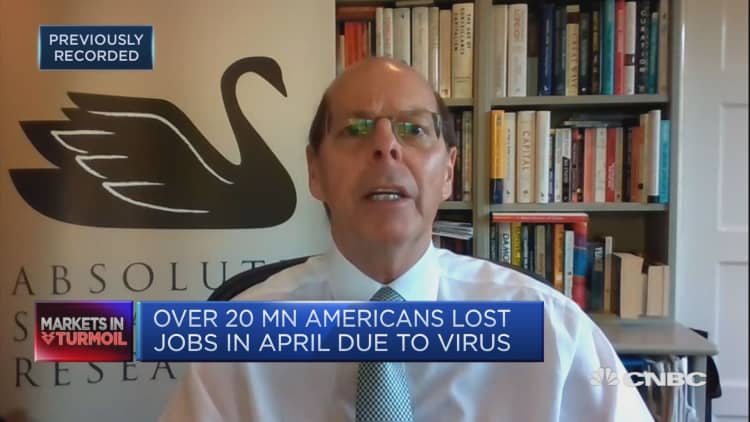
Markets are being too optimistic about the recovery from the Covid-19 pandemic, according to one strategist, who says he has adopted a "bunker mentality" amid the crisis.
Speaking to CNBC's "Squawk Box Europe" on Thursday, Ian Harnett, co-founder and chief investment strategist at Absolute Strategy Research, said corporate earnings would take longer to recover from the pandemic than many expected.
"We are talking about earnings that are going to fall between 30% and 50% this year," he said, noting that earnings took two years to recover from the 2008 financial crisis. "It will be remarkable if this is just a one-year shock to earnings."
A slew of companies around the world, including Lyft, Apple, AirFrance-KLM and PepsiCo, have withdrawn their earnings guidance amid ongoing uncertainty caused by the pandemic. Only around one in five companies listed on the S&P 500 are still providing quarterly guidance.
Financial markets have been on a roller coaster ride since the coronavirus crisis took hold. In the U.S., stock markets saw their worst first quarter on record as Covid-19 became a worldwide pandemic, but shares rallied in April amid hopes for a treatment and a leveling out of new cases. A similar pattern was seen in European markets.
However, stocks around the world took a downward turn on Thursday after Federal Reserve Chairman Jerome Powell gave a stark warning that the economy was still facing significant risks related to the outbreak.
Harnett warned that investors had unrealistic expectations for earnings in 2021, calling hopes that earnings across the S&P 500 would be up by more than 20% next year "unrealistic."
"We think it's going to be a two-year shock to earnings and that that's the big adjustment … that still needs to come through," he told CNBC. "The economic adjustment has not yet been made by these markets."
While global stock markets have been bolstered in recent months by massive cash injections from governments and central banks, Harnett said he didn't believe the additional liquidity would do anything more than prop up the banking sector.
"What we're not seeing in terms of the monetary stimulus or the fiscal stimulus is that it's enough to really drive things forward in an accelerating, rapid way, rather than just stabilizing things," he told CNBC. "Our concern is that until you see really strong signs that the dollar is coming down, that's a sign that we've got enough liquidity. That's a sign that we can really start to get excited."
According to Harnett, there was "at least one more leg down" to come in the market, which would impact economically sensitive stocks — like industrials and retail — negatively.
"We still prefer things like healthcare over the financials. That always means that you want to be overweight growth versus value, overweight quality defensive stocks," he explained. "I've still got the bunker mentality and I'm … waiting this out."
Harnett's cautiousness is shared by a number of strategists and market watchers.
Mobeen Tahir, associate director of research at WisdomTree, told CNBC on Wednesday that equity markets were "disconnected completely with the underlying economic reality" of the pandemic. Meanwhile, Frederique Carrier, head of investment strategy at RBC Wealth Management, warned earlier this month that the economy wouldn't return to pre-coronavirus levels until at least early 2022.
Charles Dumas, chief economist at TS Lombard, also shared Harnett's outlook, warning in April that the economic stimulus measures being seen worldwide would not facilitate the recovery markets are anticipating.
The International Monetary Fund has warned that the global economy is set for the deepest recession since the 1930s as a result of the coronavirus crisis, with worldwide gross domestic product (GDP) expected to contract 3% this year.

